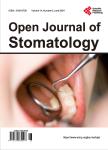The Oral Health Status of Person with Special Needs in Kumasi
The Oral Health Status of Person with Special Needs in Kumasi作者机构:The Department Child Oral Health & Orthodontics School of Medicine and Dentistry College of Health Sciences Kwame Nkrumah University of Science and Technology Kumasi Ghana The Department of Oral & Maxillofacial Sciences School of Medicine and Dentistry College of Health Sciences Kwame Nkrumah University of Science and Technology Kumasi Ghana The Department of Community Dentistry School of Medicine and Dentistry College of Health Sciences Kwame Nkrumah University of Science and Technology Kumasi Ghana
出 版 物:《Open Journal of Stomatology》 (口腔学期刊(英文))
年 卷 期:2024年第14卷第1期
页 面:14-31页
主 题:Special Needs Oral Health Dental Caries Periodontal Diseases Malocclusion
摘 要:Background: The most prevalent non-communicable disease worldwide is oral health-related disease, with dental caries and periodontal conditions being common. Oral health status significantly impacts overall health and quality of life. Barriers to dental care affect children with special needs. This study evaluates the oral health status and treatment requirements of people with special needs. Methodology: This descriptive cross-sectional study in Kumasi, Ghana examined oral health status among people, 121 children with special needs over two months, in June-July 2022. Dental caries, periodontal changes, malocclusion, and trauma were assessed. The data was analyzed using SPSS 20.0. Results: The oral health status among people with special needs in this study was generally moderate, with a range from very good to very poor. The prevalence of dental caries was 37%, with a mean DMFT score of 2.82. Periodontal health showed unsatisfactory indicators such as mobile teeth, poor gingival health, high plaque scores, and the presence of halitosis. Conclusion: This descriptive study aimed to provide baseline data on the oral health status of special needs students in Kumasi, addressing the lack of knowledge in this area. It highlighted the importance of dental care in maintaining good oral health and overall well-being in individuals with special needs. Coordinated efforts by dental professionals are needed to provide dental health education and preventive interventions for these children.



